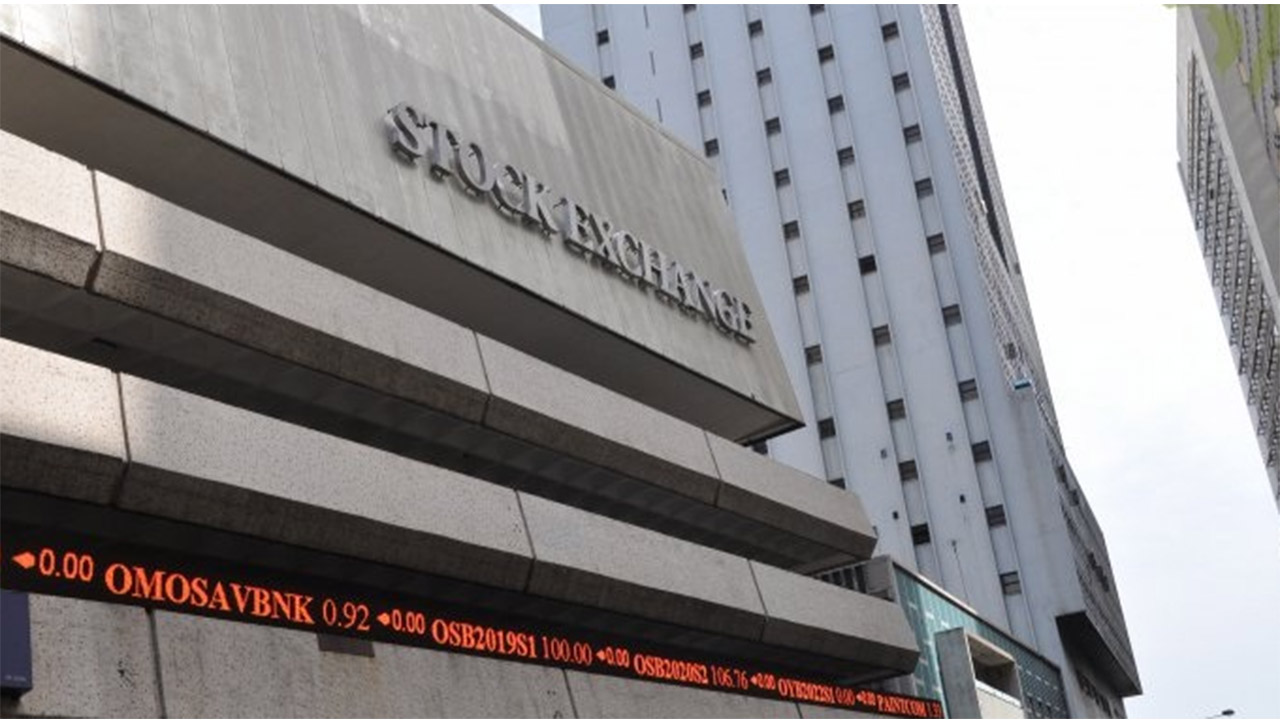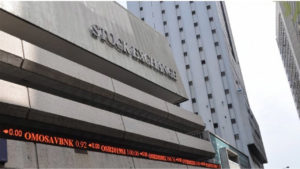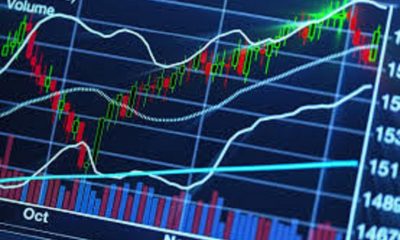Economy
Equities Investors Rake over N2.2tr in Q1 2017


By The Nation
Equities’ investors at the stock market are smiling to the bank as they netted more than N2.2 trillion gains in the first half of the year, The Nation is reporting.
Most quoted equities closed the first half at the weekend at their four-year best performance with double-digit returns ahead of inflation. Most investors saw their portfolios rising by almost a quarter, while others garnered more than double the average benchmark.
The six-month average year-to-date return at the weekend stood at 23.23 percent, almost seven percentage points ahead of the current inflation rate of 16.25 percent. In monetary terms, the year-to-date gain stood at N2.2 trillion, underlining the fact that the appreciation in market value was driven by share price increases rather than new listings.
Aggregate market value of all quoted equities on the Nigerian Stock Exchange (NSE) closed the first half at N11.452 trillion as against 2017’s opening value of N9.247 trillion, representing a net capital gain of N2.205 trillion or 23.85 percent.
The All Share Index (ASI)-the benchmark index that doubles as sovereign equities index for Nigeria, crossed seven levels to close at 33,117.48 points in the review period, compared with its year’s opening index of 26,874.62 points, representing an increase of 23.23 percent.
The rebound in the first half, driven largely by gains recorded in the second quarter, represents a major recovery for hard-pressed investors, who had lost N3.98 trillion in the past three years.
The stock market had been on a losing streak since 2014. Investors lost N1.75 trillion in 2014 and followed this with another loss of N1.63 trillion in 2015. Against the expectation that political transition and a new government will quicken a rebound, equities closed 2016 with a net capital loss of N604 billion.
Aggregate market value of all quoted equities on the NSE closed 2016 at N9.247 trillion, as against N13.226 trillion recorded at the start of trading in 2014, representing a net capital loss of N3.98 trillion.
Managing Director, Cowry Asset Management Limited, Johnson Chukwu, said the recovery was a response to positive changes in the polity, noting that the stock market performance usually aligns with macroeconomic outlook.
He said the market had remained depressed in the first quarter under poor liquidity, amidst uncertain and unrealistic foreign exchange management.But the market turned around in the second quarter, he pointed out, with the changes in the foreign exchange management and improvement in macroeconomic coordination.
Chukwu said the market recovery was boosted by the introduction of the Investors’ and Exporters’ foreign exchange window, as well as the narrowing of the exchange rates between official and parallel rates due to policy stimulation by the Central Bank of Nigeria (CBN).
He said the improvement in foreign exchange market and overall macroeconomic performance encouraged foreign portfolio investors to redirect funds to Nigerian equities, thereby supporting the domestic investors’ base.
He added that the ongoing revision of the investment guidelines for pension funds administrators (PFAs), which includes mandatory investment off a certain percentage of pension funds in equities, also encouraged many PFAs to take early positions in equities ahead of the release of the final guidelines.
GTI Capital Chief Operating Officer, Kehinde Hassan, said the market was primed for recovery by the steep declines in previous years and substantial undervaluation of several equities, pointing out that the steady corporate earnings in the previous year and first quarter of this year boosted investors’enthusiasm as companies majorly have shown resilience in the face of the tough operating environment.
He said with global projections indicating a positive outlook for the economy and the prospects that corporate earnings may remain steady, investors viewed the undervaluation of quoted equities as an incentive.
Banking stocks have been major drivers of the rally after first quarter earnings showed a largely positive performance. The Deposit Money Banks (DMBs), reported pre-tax profit of about N234 billion on gross earnings of N1.07 trillion in the first quarter of this year.
Key extracts of the interim report and accounts of banks for the three-month period ended March 31, 2017, indicated that total assets rose to N35.3 trillion by the end of the review period, driven largely by profit accretion as all tracked banks posted a profit during the period. Gross earnings totaled N1.072 trillion, driven mostly by growth in core banking operations. Profit before tax stood at N233.66 billion while profit after tax stood at N196.7 billion.
About 80 percent of tracked banks recorded higher pre and post tax profits compared with the corresponding period of the previous year while nearly all banks reported growths in top-line earnings. Average gross earnings for the industry in the first quarter stood at N71.47 billion while average profit before tax stood at N15.57 billion. After taxes, average net profit stood at N13.11 billion on the back of average total assets of N2.35 trillion.
The Nation had tracked the results of all quoted banks on the Nigerian Stock Exchange (NSE), with the exception of the troubled Skye Bank, which has not submitted both the audited report for 2016 and first quarter result for 2017. The report of Skye Bank will not lead to any material change in the overall figures for the sector. There are altogether 16 banks quoted on the NSE including Guaranty Trust Bank, Zenith Bank, Access Bank, United Bank for Africa, FBN Holdings, FCMB Group, Ecobank Transnational Incorporated, Stanbic IBTC Holdings, Unity Bank, Sterling Bank, Fidelity Bank, Union Bank of Nigeria, Wema Bank, Diamond Bank, Jaiz Bank and Skye Bank.
Banks’ chiefs said they were optimistic of continuing growths in the remaining period of the year, citing expected improvement in the macroeconomic environment.
“We remain positive that economic activities will improve as the economy is beginning to show signs of positive outlook due to an increase in the supply of foreign exchange to both retail and corporate users and decreasing headline inflation,” Stanbic IBTC Holdings Chief Executive, Mr. Yinka Sanni, said.
Sterling Bank Managing Director, Mr. Yemi Adeola, said the first quarter of this year’s performance was in line with expectations, noting that the bank would continue to explore innovative ways to improve revenue, while simultaneously enhancing the overall efficiency of its business operations.
“We remain committed to maximising shareholders’ value and delivering a superior and sustainable return, guided by our founding values of hard work, discipline and integrity,” Managing Director, Guaranty Trust Bank, Mr Segun Agbaje, said.
Source: The Nation
Economy
Flour Mills Supports 2026 Paris International Agricultural Show

By Modupe Gbadeyanka
For the second time, Flour Mills of Nigeria Plc is sponsoring the Paris International Agricultural Show (PIAS) as part of its strategies to fortify its ties with France.
The 2026 PIAS kicked off on February 21 and will end on March 1, with about 607,503 visitors, nearly 4,000 animals, and over 1,000 exhibitors in attendance last year, and this year’s programme has already shown signs of being bigger and better.
The theme for this year’s event is Generations Solution. It is to foster knowledge transfer from younger generations and structure processes through which knowledge can be harnessed to drive technological advancement within the global agricultural sector.
In his address on the inaugural day of the Nigerian Pavilion on February 23, the Managing Director for FMN Agro and Director of Strategic Engagement/Stakeholder Relations, Mr Sadiq Usman, said, “At FMN, our mission is Feeding and Enriching Lives Every Day.
“This is a mandate we have fulfilled through decades of economic shifts, rooted in a culture of deep resilience and constant innovation. We support this pavilion because FMN recognises that the next frontier of global Agribusiness lies in high-level technical exchange.
“We thank the France-Nigeria Business Council (FNBC), the organisers of the PIAS, and our fellow members of the Nigerian Pavilion – Dangote, BUA, Zenith, Access, and our partners at Creativo El Matador and Soilless Farm Lab— we are exceedingly pleased to work to showcase the true face of Nigerian commerce.”
Speaking on the invaluable nature of the relationship between Nigeria and France, and the FMN’s commitment to process and product innovation, Mr John G. Coumantaros, stated, “The France – Nigeria relationship is a valuable partnership built on a shared value agenda that fosters remarkable Intercontinental trade growth.
“Also, as an organisation with over six decades of transformational footprint in Nigeria and progressively across the African Continent, FMN has been unwaveringly committed to product and process innovation.
“Therefore, our continuous partnership with France for the success of the Paris International Agricultural Show further buttresses the thriving relationship between both countries.”
PIAS is one of the most widely attended agricultural shows, with thousands of people from across the world in attendance.
Economy
NEITI Backs Tinubu’s Executive Order 9 on Oil Revenue Remittances

By Adedapo Adesanya
Despite reservations from some quarters, the Nigeria Extractive Industries Transparency Initiative (NEITI) has praised President Bola Tinubu’s Executive Order 9, which mandates direct remittances of all government revenues from tax oil, profit oil, profit gas, and royalty oil under Production Sharing Contracts, profit sharing, and risk service contracts straight to the Federation Account.
Issued on February 13, 2026, the order aims to safeguard oil and gas revenues, curb wasteful spending, and eliminate leakages by requiring operators to pay all entitlements directly into the federation account.
NEITI executive secretary, Musa Sarkin Adar, called it “a bold step in ongoing fiscal reforms to improve financial transparency, strengthen accountability, and mobilise resources for citizens’ development,” noting that the directive aligns with Section 162 of Nigeria’s Constitution.
He noted that for 20 years, NEITI has pushed for all government revenues to flow into the Federation Account transparently, calling the move a win.
For instance, in its 2017 report titled Unremitted Funds, Economic Recovery and Oil Sector Reform, NEITI revealed that over $20 billion in due remittances had not reached the government, fueling fiscal woes and prompting high-level reforms.
Mr Adar described the order as a key milestone in Nigeria’s EITI implementation and urged amendments to align it with these reforms.
He affirmed NEITI’s role in the Petroleum Industry Act (PIA) and pledged close collaboration with stakeholders, anti-corruption bodies, and partners to sustain transparent management of Nigeria’s mineral resources.
Meanwhile, others like the Petroleum and Natural Gas Senior Staff Association of Nigeria (PENGASSAN) have kicked against the order, saying it poses a serious threat to the stability of the oil and gas industry, calling it a “direct attack” on the PIA.
Speaking at the union’s National Executive Council (NEC) meeting in Abuja on Tuesday, PENGASSAN President, Mr Festus Osifo, said provisions of the order, particularly the directive to remit 30 per cent of profit oil from Production Sharing Contracts (PSCs) directly to the Federation Account, could destabilise operations at the Nigerian National Petroleum Company (NNPC) Limited.
Mr Osifo firmly dispelled rumours of imminent protests by the union, despite widespread claims that the controversial executive order threatens the livelihoods of 10,000 senior staff workers at NNPC.
He noted, however, that the union had begun engagements with government officials, including the Presidential Implementation Committee, and expressed optimism that common ground would be reached.
Mr Osifo, who also serves as President of the Trade Union Congress (TUC), expressed concerns that diverting the 30 per cent profit oil allocation to the Federation Account Allocation Committee (FAAC), without clearly defining how the statutory management fee would be refunded to NNPC, could affect the salaries of hundreds of PENGASSAN members.
Economy
Dangote Cement Deepens Dominance, Export Activities With $1bn Sinoma Deal

By Aduragbemi Omiyale
To strengthen its domestic market dominance, drive its export activities, optimise existing operational assets and enhance production efficiency and capacity expansion, Dangote Cement Plc has sealed $1 billion strategic agreements with Sinoma International Engineering for cement projects across Africa.
The president of Dangote Industries Limited, the parent firm of Dangote Cement, Mr Aliko Dangote, disclosed that the deal reinforces the company’s long-term growth strategy and aligns with the broader aspirations of the Dangote Group’s Vision 2030.
According to him, Sinoma will construct 12 new projects and expand others for the cement organisation across Africa, helping to achieve 80 million tonnes per annum (MTPA) production capacity by 2030, while supporting the group’s overarching target of generating $100 billion in revenue within the same period.
Under the Strategic Framework Agreement, Sinoma will collaborate with Dangote Cement on the delivery of new plants, brownfield expansions, and modernisation initiatives aimed at strengthening operational performance across key markets.
The new projects include a new integrated line in Northern Nigeria with a satellite grinding unit, a new line in Ethiopia and other projects in Zambia/Zimbabwe, Tanzania, Sierra Leone and Cameroon. In Nigeria, Sinoma will also handle different projects in Itori, Apapa, Lekki, Port Harcourt and Onne.
The projects signal Dangote Cement’s sustained commitment to consolidating its leadership position within the African cement industry, while enhancing its competitiveness on the global stage.
Chairman of the Dangote Cement board, Mr Emmanuel Ikazoboh, during the agreement signing event in Lagos, explained that the new projects would enable the company to play a critical role in actualising Dangote Group’s Vision 2030.
The new projects, when completed, will increase Dangote Cement’s capacity and dominant position in Africa’s cement industry.
On his part, the Managing Director of Dangote Cement, Mr Arvind Pathak, said the agreement reflects the company’s determination to grow its investments across African markets to close supply gaps and support the continent’s infrastructural ambitions.
According to him, Dangote Cement is committed to making Africa fully self‑sufficient in cement production, creating more value and linkages, leading to increased economic activities and a reduction in unemployment.
-

 Feature/OPED6 years ago
Feature/OPED6 years agoDavos was Different this year
-
Travel/Tourism10 years ago
Lagos Seals Western Lodge Hotel In Ikorodu
-

 Showbiz3 years ago
Showbiz3 years agoEstranged Lover Releases Videos of Empress Njamah Bathing
-

 Banking8 years ago
Banking8 years agoSort Codes of GTBank Branches in Nigeria
-

 Economy3 years ago
Economy3 years agoSubsidy Removal: CNG at N130 Per Litre Cheaper Than Petrol—IPMAN
-

 Banking3 years ago
Banking3 years agoSort Codes of UBA Branches in Nigeria
-

 Banking3 years ago
Banking3 years agoFirst Bank Announces Planned Downtime
-

 Sports3 years ago
Sports3 years agoHighest Paid Nigerian Footballer – How Much Do Nigerian Footballers Earn

















